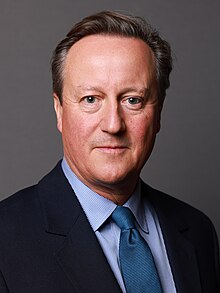Portal:Oxfordshire
The Oxfordshire Portal

Oxfordshire (/ˈɒksfərdʃər, -ʃɪər/ OKS-fərd-shər, -sheer; abbreviated Oxon) is a ceremonial county in South East England. The county is bordered by Northamptonshire and Warwickshire to the north, Buckinghamshire to the east, Berkshire to the south, and Wiltshire and Gloucestershire to the west. The city of Oxford is the largest settlement and county town.
The county is largely rural, with an area of 2,605 km2 (1,006 sq mi) and a population of 691,667. After Oxford (162,100), the largest settlements are Banbury (54,355) and Abingdon-on-Thames (37,931). For local government purposes Oxfordshire is a non-metropolitan county with five districts. The part of the county south of the River Thames, largely corresponding to the Vale of White Horse district, was historically part of Berkshire.
The lowlands in the centre of the county are crossed by the River Thames and its tributaries, the valleys of which are separated by low hills. The south contains parts of the Berkshire Downs and Chiltern Hills, and the north-west includes part of the Cotswolds; all three regions are Areas of Outstanding Natural Beauty. The county's highest point is White Horse Hill (261-metre (856 ft)), part of the Berkshire Downs. (Full article...)
Selected article
Henley-on-Thames (/ˌhɛnli-/ ⓘ HEN-lee) is a town and civil parish on the River Thames in Oxfordshire, England, 9 miles (14 km) northeast of Reading, 7 miles (11 km) west of Maidenhead, 23 miles (37 km) southeast of Oxford and 37 miles (60 km) west of London (by road), near the tripoint of Oxfordshire, Berkshire and Buckinghamshire. The population at the 2021 Census was 12,186. (Full article...)
Selected biography
David William Donald Cameron, Baron Cameron of Chipping Norton, PC (born 9 October 1966) is a British politician who has served as Foreign Secretary since 2023. He previously served as Prime Minister of the United Kingdom from 2010 to 2016, as Leader of the Conservative Party from 2005 to 2016, and as Leader of the Opposition from 2005 to 2010, while serving as Member of Parliament (MP) for Witney from 2001 to 2016. He identifies as a one-nation conservative and has been associated with both economically liberal and socially liberal policies.
Born in London to an upper-middle-class family, Cameron was educated at Eton College and Brasenose College, Oxford. Becoming an MP in 2001, he served in the opposition Shadow Cabinet under Conservative leader Michael Howard, and succeeded Howard in 2005. Following the 2010 general election, negotiations led to Cameron becoming prime minister as the head of a coalition government with the Liberal Democrats. His premiership was marked by the ongoing effects of the global financial crisis, which his government sought to address through austerity measures. His administration passed the Health and Social Care Act and the Welfare Reform Act, which introduced large-scale changes to healthcare and welfare. It also enforced stricter immigration policies, introduced reforms to education and oversaw the 2012 London Olympics. Cameron's administration also privatised Royal Mail and some other state assets, and legalised same-sex marriage in England and Wales. Internationally, Cameron's government intervened militarily in the First Libyan Civil War and authorised the bombing of the Islamic State. Domestically, his government oversaw the referendum on voting reform and Scottish independence referendum, both of which confirmed Cameron's favoured outcome.
When the Conservatives secured an unexpected majority in the 2015 general election, he remained as prime minister, this time leading a Conservative-only government. To fulfil a manifesto pledge, Cameron introduced a referendum on the UK's continuing membership of the European Union in 2016. He supported the Britain Stronger in Europe campaign. Following the success of the Leave vote, Cameron resigned as prime minister and was succeeded in the 2016 Conservative Party leadership election by Theresa May. Post his premiership, Cameron gave up his seat and served as the president of Alzheimer's Research UK from 2017 to 2023. During the November 2023 cabinet reshuffle, Conservative prime minister Rishi Sunak appointed Cameron foreign secretary and recommended him for a life peerage. Cameron is the first former prime minister to be appointed to a ministerial post since Alec Douglas-Home in 1970. Cameron has been credited for helping to modernise the Conservative Party and for reducing the United Kingdom's inherited national deficit as prime minister. However, he was subject to a level of criticism for the 2015 manifesto commitment to implement the referendum on the UK's continued membership of the EU and his vocal support for remain, which ultimately led to his resignation as prime minister. This led to a sustained period of political instability. After leaving office, he was implicated in the Greensill scandal. In historical rankings of prime ministers of the United Kingdom, academics and journalists have ranked Cameron in the fourth and third quintiles, respectively. (Full article...)
Topics
Selected images
Subcategories
Things to do
Find references for: A420 road | Abingdon, Oxfordshire | Abingdon School | Anthony Kitchin | Banbury | Banbury mutiny | Bicester | Bicester Community College | Blowing Stone | Boris Johnson | Brakspear | Brenda Rawnsley | Chiltern Main Line | Clanfield F.C. | Colin Greenwood | Debagging | Deddington | Degrees of the University of Oxford | Edward, the Black Prince | Edward the Confessor | European route E5
Expand: A4260 road | Alvescot | Appleton, Oxfordshire | Appleton-with-Eaton | Ardington | Ardington Wick | Arms of the University of Oxford | Ascott Earl | Ascott d'Oyley | Ashbury, Oxfordshire | Aston Rowant | Aston Upthorpe | Baldon Row | Balscote
Create: Banbury Cross Retail Park | Banbury Golf Club
WikiProjects
Related portals
Associated Wikimedia
The following Wikimedia Foundation sister projects provide more on this subject:
-
Commons
Free media repository -
Wikibooks
Free textbooks and manuals -
Wikidata
Free knowledge base -
Wikinews
Free-content news -
Wikiquote
Collection of quotations -
Wikisource
Free-content library -
Wikiversity
Free learning tools -
Wikivoyage
Free travel guide -
Wiktionary
Dictionary and thesaurus




























